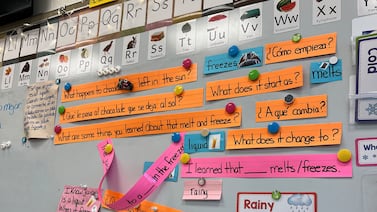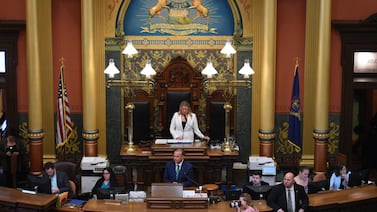For a fifth straight year, Tennessee has delayed its plan to start giving A-F grades to its 1,800-plus public schools.
Education Commissioner Penny Schwinn notified district leaders Wednesday about her decision for another pause, which she blamed on inconsistency in data caused by three straight years of pandemic-related disruptions across the state.
Specifically, Schwinn cited uneven participation rates of students taking state tests under the Tennessee Comprehensive Assessment Program, known as TCAP. The state relies on those test results over multiple years when evaluating teachers and student growth and rating the effectiveness of schools and districts.
The commissioner said almost a fourth of schools did not meet the Tennessee and national standard of 95% of their students participating in state testing in the 2020-21 school year.
Another delay in letter grades means Tennessee parents and communities won’t have as much straightforward information about the quality of their schools as intended under a 2016 state law ordering the creation of a new grading system.
The state had planned to begin assigning grades in 2018 but has repeatedly pushed pause. First, online testing problems called into question the reliability of 2018 scores and led to emergency legislation so that schools wouldn’t be punished for poor results. Then in 2020, the pandemic prompted the cancellation of state testing nationwide.
In 2021, the state used results from its first pandemic test scores, which showed a dramatic reversal of previous gains in achievement, to develop learning improvement plans instead of to rate schools or evaluate teachers. That year, the state reported a higher-than-expected testing participation rate, despite administering TCAPs during the pandemic.
But now, after this year’s scores showed a return to pre-COVID levels, Schwinn is suggesting that inconsistent participation data across several years is skewing the results for holding schools accountable.
Tennessee planned to base its overall school letter grades on student test results over multiple years, as well as other factors such as chronic absenteeism, out-of-school suspensions, and the readiness of high school graduates for college and career.
In her letter to superintendents, Schwinn said, “it is not possible to issue letter grades that fairly and transparently communicate the performance and progress of schools at this time.”
“This A-F letter grading accountability system should always reflect consistent and trustworthy information to families, and especially so in this inaugural year,” she wrote.
Schwinn said the state “remains committed to accountability” and still plans to issue its lists of high-growth and low-performing schools, including those that are academically in the state’s bottom 5%. The public release is scheduled for Sept. 12.
“We will continue to celebrate our high-progress and high-performing schools,” she said, “as well as supporting and intervening in our low-performing schools.”
Leaders of several education advocacy groups say they’re anxious to see that data.
Gini Pupo-Walker, state director of The Education Trust in Tennessee, says she has more questions than answers based on Schwinn’s letter to district leaders.
“How can we have confidence in the designation of low-performing schools if we don’t have confidence in how participation affects the overall metrics?” Pupo-Walker asked.
“It’s also important to help stakeholders understand why last year’s participation rate is affecting school accountability this year,” she said. “Ultimately, it’s important to know how our students and schools are doing, and for us to see how they’re faring on multiple measures over time.”
In the meantime, Tennessee’s main platform for sharing information about its public schools is falling short of its purpose to provide parents and communities with critical facts about how schools are meeting the needs of all students.
Since late spring, the state’s online report card has been unavailable, making it harder for parents trying to look up state test results, as well as other information about school attendance, staffing, and finances.
Schwinn told superintendents the state will publish the report card with updated data in late November.
You can read Schwinn’s letter to superintendents at the bottom of this page.
Marta W. Aldrich is a senior correspondent and covers the statehouse for Chalkbeat Tennessee. Contact her at maldrich@chalkbeat.org.







